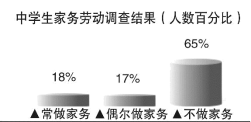Last year, Chinese from far-off cities flocked to Rongjiang County to watch an amateur village football super league, the VSL, or, CunChao. There was an audience of 50,000 once
Football in Rongjiang County has a time-honored history,
The league’s cultural
People’s hopes for the
One bright Saturday morning, Mali and her mom walked around the neighbourhood. That is, her mom walked, but Mali ran, skipped, jumped over puddles and visited the neighbours’ dogs. Mali paused to look at the budding (发芽) trees on her block. “I can’t wait until summer,” she said, “especially for Mrs. Fair’s great tomatoes at her market stand.” She pointed.
Mali’s mom stood looking at the empty lot where the market was set up every summer weekend. She looked at Mali, “Honey, Mrs. Fair told me last week that she had to close her stand. She’s really getting too old to run it anymore.”
Mali turned, stared, and put her hands on her waist. “But Mrs. Fair’s stand can’t close!” she said. “It’s the only place in the neighbourhood we can buy fresh, delicious tomatoes.” Then she added, to show she wasn’t being selfish, “Everyone needs fruits and vegetables for a healthy diet.”
After they got home, Mali headed out to her backyard swing to think. “If only I could plant a garden,” she thought. “but our yard is way too small.” Just then, she noticed her neighbour, Mr. Taylor, looking at his daffodils. Mali knew he was thinking about how he had planted those flowers with his wife. This was the first spring since his wife had died, and Mali saw the sadness on his face. Then she had an idea.
Mali cleared her throat, and Mr. Taylor looked up. Mali decided to walk over to the fence. “Hi, Mr. Taylor,” she said. He waved, and turned away. “Wait!” Mali cried. Taking a risk while she still felt brave, she rushed to gather her thoughts. “Mr. Taylor, Mrs. Fair isn’t doing her tomato stand anymore because she’s getting old. So I’d like to grow tomatoes. I don’t want to get in the way of your flowers, but I really want tomatoes.”
Suddenly, Mr. Taylor smiled. “Mali, I’m not sure what you’re talking about, but you’ve made me smile. Reasons to smile have been scarce lately. What do you want to do?” Mali repeated, “I wanted to plant tomatoes, but I have no big land.” She sounded a little awkward.
注意:1. 续写词数应为150个左右;2. 请按如下格式在答题卡的相应位置作答。
Just then, an idea came to Mr. Taylor.
____________________________________________________________________________________________________________________________________________________________________________________________________________________________________________________________________________________________________________________________________________________________________________________________When the fruit ripened, there were more juicy, red tomatoes than even Mali could have imagined.
____________________________________________________________________________________________________________________________________________________________________________________________________________________________________________________________________________________________________________________________________________________________________________________________1. 劳动状况描述;
2. 原因分析;
3. 你的建议。

1. 写作词数应为80左右;
2. 按如下格式作答,题目已为你写好。
Housework, Our Responsibility
____________________________________________________________________________________________________________________________________________________________________________________________________________________________________________________________________________________________________________________________________________________________________________________________4 . Kim Stemple, a special-education teacher, faced terrible diseases during her stay in a Boston hospital. While
Before Stemple got too sick to
Inspired by this life-changing
Part of the process
| A.wrestling | B.competing | C.quarreling | D.parting |
| A.live | B.heal | C.exercise | D.recover |
| A.cheating | B.clearing | C.breaking | D.reminding |
| A.Casually | B.Desperately | C.Temporarily | D.Surprisingly |
| A.explaining | B.lifting | C.discovering | D.absorbing |
| A.season | B.plan | C.experience | D.solution |
| A.common | B.tough | C.pointless | D.dangerous |
| A.race | B.game | C.secret | D.seed |
| A.collected | B.assessed | C.borrowed | D.bought |
| A.promoted | B.insisted | C.involved | D.shaped |
| A.connection | B.barrier | C.division | D.conflict |
| A.trained | B.stuck | C.operated | D.warned |
| A.document | B.message | C.receipt | D.gift |
| A.threw away | B.put down | C.acted as | D.dropped out |
| A.shy | B.weak | C.tired | D.alone |
5 . Tai Chi, a gentle martial art originating from China and involving slow movements with a focus on breathing and on what your body is doing in that moment, provides numerous benefits for both physical and mental well-being. Here are five convincing reasons to bring Tai Chi into your routine.
●It’s easy on the body.
Tai Chi offers gentle exercise suitable for individuals of all ages and fitness levels.
●It could prevent falls.
A review of studies conducted in 2019 indicated that Tai Chi could lower the risk of falls among older people. Certainly, the emphasis is on balance, with sideways and backwards movements aiding in the strengthening of the muscles necessary for stability.
●It may boost brain power.
●
A reduction in stress and anxiety, along with an increase in confidence, is another mental health benefit of Tai Chi, as indicated by research findings, though further research is needed to comprehensively understand and confirm these effects.
●You can do it at home.
Attending classes can be beneficial for receiving structured instruction and connecting with like-minded individuals.
| A.It has the feel-good factor |
| B.It can improve heart health |
| C.The benefits aren’t just physical |
| D.But there are videos available online too |
| E.They also improve flexibility and spatial awareness |
| F.Its low-impact nature minimizes the risk of joint injury |
| G.You can share experiences with these people face-to-face |
6 . The news is everywhere. We can’t stop constantly checking it on our computer screens, but what is this doing to our minds?
The news is committed to laying before us whatever is supposed to be most unusual and important in the world: a snowfall in the tropics; a love child for the president; a set of conjoined (连体的) twins.
The news knows how to operate its own mechanics almost invisible and therefore hard to question. It speaks to us in a natural unaccented voice, without reference to its own perspective. It fails to disclose that it does not merely report on the world, but is instead constantly at work crafting a new planet in our minds in line with its own often highly distinctive priorities.
Why do we, the audience, keep checking the news? Fear has a lot to do with it. After even a short period of being cut off from news, our anxiety has a habit of building up. We know how much is likely to go wrong and how fast: an A380 may have its fuel line cracked and crash into the bay in flames, a virus from an African bat may leap the species barrier and enter a crowded Japanese commuter train, investors may pose a run on the currency and yet another seemingly ordinary father may call a violent end to the lives of his two beautiful young children.
The hum and rush of the news have flowed into our deepest selves. What an achievement a moment of calm now is, what a miracle the ability to fall asleep or to talk undistracted with a friend and what demanding discipline would be required to make us turn away from the messy news and listen for a day to nothing but the rain and our own thoughts. We may need some help with what the news is doing to us: with the envy and the terror, with the excitement and the frustration; with all that we’ve been told and yet occasionally suspect we may be better off never having learned.
1. What does news offer us according to the passage?| A.Its operating system. |
| B.Its preferred world. |
| C.Normal happenings worldwide. |
| D.Objective points of view. |
| A.worried about losing contact with updates. |
| B.anxious about building up a habit. |
| C.curious about an African virus in Japan. |
| D.interested in strangers’ extraordinary lives. |
| A.Talking with a friend is remarkable. |
| B.Listening to natural songs is absolutely impossible. |
| C.Preventing envy and terror is realistic. |
| D.Staying clear of the media is beneficial. |
| A.News is transforming our lifestyle secretly. |
| B.News is becoming a user’s manual. |
| C.News is filling us with growing fear. |
| D.News is enriching our life dramatically. |
7 . In 1986, King Charles suggested talking to plants, a thought initially mocked but now supported by evidence that plants can detect, react to, and potentially produce sound.
Since plants have been evolving alongside the insects for hundreds of millions of years, Heidi Appel, a botanist and Reginald Cocroft, an entomologist wondered if plants might be sensitive to the sounds made by insects. The researchers recorded the vibrations (声音震动) from caterpillars (毛虫) as they chewed on leaves. Then the plants were exposed to the recorded vibrations while no caterpillars were actually present. The results were striking. Leaves that had been exposed had significantly higher levels of defensive chemicals, making them much harder for the caterpillars to eat. The research may have practical consequences, such as using drones armed with speakers to warn crops of pest threats, offering an eco-friendly alternative to chemical pesticides.
Further studies by ecologist Monica Gagliano reveal that plants, like pea plants, can “hear” water through sound, with roots responding to water-related vibrations even when the water is inaccessible. This finding could have implications for preventing damage to sewer (下水道) systems caused by plant roots. The assumption had been that it was leaks that attracted the roots. The solution, she says, might be to invest in pipes that are silent as water runs through them.
Additionally, the study by the team at Tel Aviv University revealed that plants under stress, due to factors like insufficient water or physical damage, make high-frequency sounds, which can be detected even in noisy environments. This opens possibilities for using microphones to monitor plant health in agriculture, potentially aiding farmers in identifying and addressing crop issues.
Despite some questions remaining to be solved, these fascinating discoveries cast new light on plants’ ability to perceive and respond to sounds in their environment. Plants live in a world full of sounds due to human civilization, and it is worth investigating this interesting aspect. Perhaps researchers might even seek funding from King Charles.
1. What was the original reaction to King Charles’s suggestion?| A.Ambiguous. | B.Favourable. |
| C.Indifferent. | D.Opposed. |
| A.Introducing drones with speakers to farmers. |
| B.Applying chemicals to enhance plant growth. |
| C.Stimulating plants to release anti-pest chemicals. |
| D.Developing new types of protective pesticides. |
| A.To reduce noise pollution. |
| B.To protect sewer systems. |
| C.To improve water transportation. |
| D.To attract plant roots to accessible water. |
P: paragraph
A. | B. |
C. | D. |
1. During which season did the speaker’s journey take place?
| A.Winter. | B.Fall. | C.Summer. |
| A.Traveling alone. |
| B.Challenging weather conditions. |
| C.Overcoming physical difficulties. |
| A.They taught him a new language. |
| B.They invited him to their house. |
| C.They taught him how to ride a horse. |
| A.To have more materials for his book. |
| B.To visit the host family. |
| C.To make new friends. |
1. What is the main idea of the conversation?
| A.The fact that robots will replace humans entirely. |
| B.The fact that robots will take jobs from humans. |
| C.The fact that robots will be introduced into people’s homes. |
| A.They do more with less cost. |
| B.They are not very friendly. |
| C.They break down regularly. |
| A.3%. | B.15%. | C.33%. |
1. What is the man’s job probably?
| A.A university professor. |
| B.A seaport manager. |
| C.A ship captain. |
| A.China. | B.Italy. | C.Singapore. |



